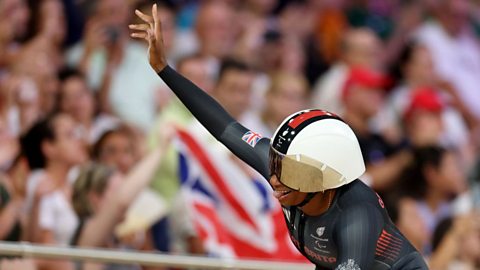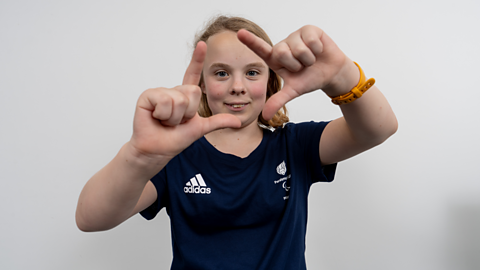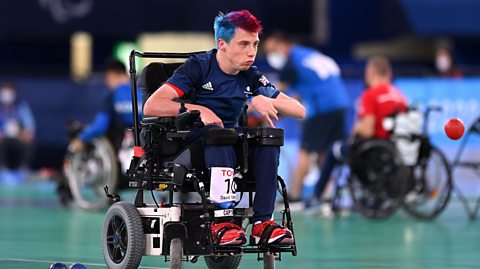Years of build-up, months (sometimes decades!) of training, hours enjoying the coverage and just like that, the Paris 2024 Paralympic Games cross the finish line. ParalympicsGB exceeded their medal tally from Tokyo 2020 with more than 50 percent of the 215 British athletes who competed reaching the podium.
Sights are now set on LA, the hosts of the 2028 Games, but while the Paralympics are put on the back-burner for many sport fans, as 19-time Paralympic champion Dame Sarah Storey says, the athletes "don't disappear now for four years and just reappear on the aeroplane to get to the next one."
It's vital Para sport isn't forgotten for the next three years and it's imperative that children see disabled representation in sport throughout their young lives. So when the ParalympicsGB team whistled home to St Pancras, London, Super Movers for Every Body asked 'how do we keep the Para sport movement going?'
Watch the film to hear their thoughts.
Hannah Cockroft: It's so important now after such a massive Paralympic Games - Paris did a fantastic job - that we just keep the focus on Para athletes.
Dame Sarah Storey: We need to see coverage happening in between the four years. You know, we don't disappear now for four years and just reappear on the aeroplane to get to the next one, or the train.
Amy Truesdale: People just don't realise there's European Championships, there's World Championships, there's masses of events that go on within the four year cycle, which doesn't really get the representation. So I think it's just amazing to keep the movement going and keep everyone clued about Para sports, that there is an opportunity for people out there if they're not aware of it already.
Abdi Jama: We're athletes, you know, forget about the disability. We're athletes. We train as hard as anybody else in the world and we showcase that. And I think it's about time that we keep pushing it and give opportunities to young disabled… that's inspiring to be the next Paralympians. And for me it's education in school. Physical education needs to be more inclusive.
Iona Winnifrith: It's really important to see Para sports, because most children with disabilities don't do sports, because they're either not allowed to, or like, things like that.
Claire Cashmore: I think for me it's more representation, it's seeing disability day in, day out so it becomes normalised, it's not a taboo subject. And following the careers of athletes, you know, year in, year out, so they become household names so people can be invested in it.
Dave Ellis: Just get it on the TV, get it out there more in between those four years, so people actually grow a following in the sport and they're not like, going: 'I've never seen this person before but it's incredible,' they're like: 'I know who this person is. I'm behind them all the time.'
Hannah Cockroft: Everyone wants to go to a Paralympic Games, but actually there's so many events throughout the year that you can attend for free that are probably in your local area.
Alfie Hewett: Sport is a great platform to be able to, you know, have change and make change and educate as well. You've seen that this Paralympics it's been incredible, the attention and the eyes that have been on all the sports. So you don't want it to happen just once every four years, you want to try and, you know, take that opportunity and keep the ball rolling, pardon the pun!

Paris 2024: Who are the teachers that supported our sports stars?
It's been an incredibly successful year at the Paris 2024 Paralympic Games, with the ParalympicsGB team returning home 2nd in the medal table with 124 medals.
While each elite athlete has earned their individual success through hard work and determination, it's also thanks to the support of those around them who've helped our stars get to where they are today.
As the ParalympicsGB athletes arrived home Super Movers for Every Body asked about the teachers who've made an impact on their sporting journeys.
"Teachers are the people that shape your early life and I was incredibly lucky to have one that ultimately made me who I am today." said nine-time Paralympic champion Hannah Cockroft.
Watch the film to hear Paralympians give thanks to the schools and staff that supported them.
Matt Bush: Yeah, so my primary school headmaster was very keen on sport, Shane Buckley, shout out. And he was really encouraging and like, just so supportive and just got me involved in all sport and I was like, super keen, had loads of energy. Then I also had a teacher in year five, Lynn Hart, she would let us do sport every single day and it would like, improve my performance in class because I would get the energy out outside.
Claire Cashmore: I felt like I had an incredibly supportive network within P.E. Yes, there is things that I couldn't do, but we are the best innovators, we find ways around things. You know, we're constantly adapting and I think that's the thing, just give them the tools, help them out, and allow them to be involved so they can adapt and enjoy it in the same way that everybody else does.
Amy Truesdale: My teachers were really supportive when I started Taekwondo, because I started it at a very young age. The instructor just made it adaptable so that I could get involved. So, yeah, I think having mentors that are supportive, that was really valuable when I was younger.
Bly Twomey: Miss Tate has been supporting me so much and she's just been, just an incredible person to have around.
Alfie Hewett: Yeah, I had a good P.E teacher, Mr. Morgan, he was always very supportive of my tennis. He actually allowed me to play tennis within P.E lessons in school. So, basically I was training during P.E, which was kind of… kind of cool.
Gordon Reid: I mean, I was really lucky, I went to Hermitage Academy Secondary School and they were brilliant with me, with the tennis. They, you know, they allowed me to take time off to go to tournaments and… yeah, have a little bit of a different schedule with classes for training as well, so, just all the… all the teachers there.
Hannah Cockroft: I think teachers are the people that shape your early life and I was incredibly lucky to have some amazing teachers, but one that really, really stood out and ultimately made me who I am today.

Paris 2024: What inspiration do Paralympians want us to take away from the Games?
As we reach the end of a magnificent Paralympic year, our ParalympicsGB athletes have certainly inspired the UK with their incredible performances in Paris.
But our athletes want to show that the Paralympic Games isn't just about winning medals; it's also important to represent the value of sport within the disability community. They hope that the Games can inspire disabled people to get more involved in sport and showcase that sport is for everybody and has great life benefits.
Amy Truesdale, gold medallist in the taekwondo women's +65 kg category, hopes the main takeaway from the games is that: "You can do anything that you want to as long as you put your mind to it…don't allow society to put limitations on you."
The Paralympic champion added that the most important thing to remember when taking part in sport is to "have fun and enjoy it."
Watch the film below to hear parting words from the ParalympicsGB team.
Abdi Jama, Wheelchair basketball:You know, I just showcase my ability of anything is possible. You know, I'm a young kid that came from Toxteth in Liverpool, andfor me to to be where I am at the moment, it's an achievement that I'm proud of. Dedication, all the hard work and I have amazing friends, families that have pushed me all the way that have supported me. So for me, it's, you know, I can only do what I can do to showcase that anything is possible, if you put the hard work and dedication and have the support.
Amy Truesdale, Taekwondo:You can do anything that you want to as long as you put your mind to it, and just don't allow society to put limitations on you and just believe you can do it. And just most importantly, have fun and enjoy it.
Matt Bush, Taekwondo:I'd like to work on a few things that would help athletes, um, as they retire or carry on and just help improve the lives of of athletes who give so much for the country and for the sports.
Hannah Cockroft, Wheelchair racing:Sport's for everyone, everyone can do physical activity, and you don't have to want to be a gold medallist or a Paralympian. You can literally just want to have fun with it and that's absolutely fine. So I want everyone to to start thinking, like instead of just closing that door and saying, no, how can you make your sport, your club, whatever it is, how can you make it accessible? How can you include that person? And that's how we make great athletes.



